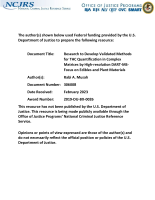Webinar Transcript: Fiscal Year 2024 Evaluating Strategies to Advance the Implementation of Evidence-Based Policies and Practices Solicitation
This webinar provided an overview of the NIJ FY 2024 Evaluating Strategies to Advance the Implementation of Evidence-Based Policies and Practices solicitation, in which...




